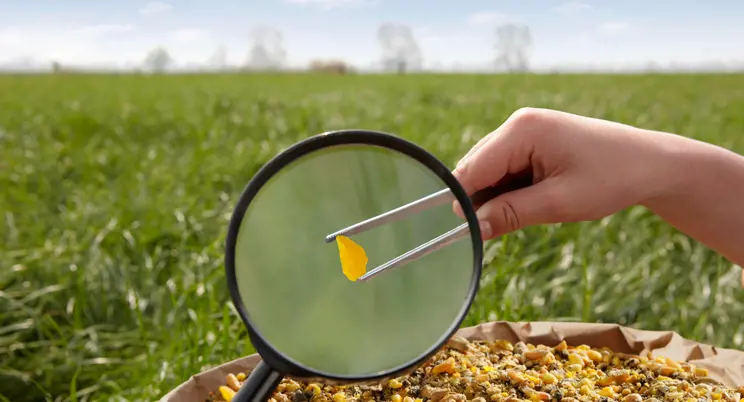Home Mixing Opportunities
The number of farmers who are moving to mix their feed on commercial Pig and Poultry farms is increasing. For the pigs, it is usually dry feeding, but there are also systems in place that make use of liquid- or whey-feeding systems. Costs can be saved by mixing your feeds and procuring your raw materials rather than buying complete feed from a feed manufacturer. There are many pros and cons to be considered when moving to home-mixing. A good quality product must be put in front of the animals so they can grow or reproduce optimally and reach their full genetic potential.

De Heus quality control systems
For De Heus, the procuring of the best quality raw materials we can get is very important to us. Every raw material coming into each of our four feed mills goes through quality checks and testing to make sure that it is within the required specification and is not contaminated.
We always strive to buy our raw materials from reputable suppliers that we have audited to confirm that they have acceptable quality and control processes in place. In this way, we ensure the quality of the raw materials and products that you get from De Heus.
Important Check Points when Mixing Your Feed
Below are some of the important control points you should check regularly to make sure that your mill is working accurately and efficiently.
- Dosing and Transport to Scales
-
- Speed and the incline angle of the augers.
- Use the correct size auger for the job.
Accurate control of dosing onto the scales. - Accuracy of hand-weighed ingredients.
- Scales
- Correct scale sizes - large quantities weighed on bigger scales, and smaller quantities weighed on smaller, more accurate scales.
- Regular scale calibration to check they are weighing accurately.
- Hammermill and Mixer
- Check for damage to the screens and the condition of the hammers.
- The amount of material in the mixer must be sufficient to ensure homogeneous mixing.
- The order in which raw materials are dosed into the mixer is important.
- Mixing time is important to get a good homogeneous mix and to prevent de-mixing.
- Dosing of oils and liquids.
- Storage before and after mixing
- Is it clean?
- Is there a chance of contamination?
- Segregation
- Is the final product bin empty before a new product is added and put into it?
- Formulations
- Is the formula you have on paper the same as what is being mixed?
- Quantities may be rounded during production to match the available bag sizes. This should be done during formulation to prevent variable results.
- In the animal house - they will show you a lot even before you enter the mill.
- Are the feed intakes normal?
- Check the manure quality and colour.
- Look to see if there is any undigested feed in manure.
- In the feed-in troughs, look for:
-
- Is there too much fine material?
- The presence of very large particles or whole grains could indicate the screen in the hammermill is damaged.
- Does the feed look well mixed? If not, check the mixing time or the method of transport to the farm.
-
Customized Nutrition
Every farm has different needs, possibilities, and solutions. De Heus is a family-owned, international company that has been producing feed for over 100 years. With the growth of the company, there were many changes have taken place over the years as new technologies and information became available.
That is why we have our own research and development team, who are always working to improve the quality of our feeds. With this support, we can assist any farm in any specific situation with customized feeds which are most suitable for them.
This includes species-specific nutrient requirements, different housing and environment, and genetic differences. With our global team of experts, we will be able to design a solution to any nutritional problem that might occur on a farm and make the formulation accordingly.
What can De Heus offer the Home-Mixer?
De Heus purchases large volumes of a wide range of raw materials to meet the requirements of our feed mills. We share this advantage with home-mixing customers to help them with the sourcing and purchasing of well-priced, good-quality raw materials. Sourcing raw materials and procuring those for your feed mill on the farm can often be very challenging as the markets can be unpredictable. Our local and international Procurement Teams have a good, up-to-date knowledge of what is happening in the raw material markets as well as how to make the best use of the different available pricing instruments. Individual farmers have different requirements, and we can put together a solution that is tailored to meet your requirements.
The milling and mixing of animal feed are what De Heus is good at. We can give you advice on the different aspects of your feed mill to help improve its flow and efficiency. This will help you to produce consistent, quality feed for your animals.
At De Heus, we have a team of technical and nutritional experts available to assist with any challenge that you are facing on your farm. Our nutritionists can design a custom diet to suit your farm, making use of macro packs. The macro packs are formulated to work with the available raw materials.
Diets can be reformulated to suit your needs when there are shortages of raw materials or when they are no longer available. An additional advantage to De Heus assisting you with your formulations is that should you have problems with your feed mill; we will be able to supply you with the same nutrition that your animals are already used to and which is working well on your farm.
If you produce your own maize and/or other grains that you would like to mix into your feed, we have a range of registered concentrates that you can use. We can also design customized concentrates to make the best use of the raw materials that you are producing.
If you do not want to mix your feed on the farm, we are happy to take in your raw materials and
grist these into feeds that you buy from us, and you will receive a credit for these raw materials at the end of each month until the volume of those raw materials that were supplied to us has been used up.
Lastly, we do have a wide range of registered complete feed options that you can also choose from to suit your needs.
If you are interested in talking to us about how we can help you, please contact us on 031 785 1575 and ask for our Procurement Manager.
For more information or any questions regarding our other products, please contact your nearest technical advisor.
